Oberlin Alumni Magazine
Summer 2007 Vol. 103 No. 1
Alumni Notes
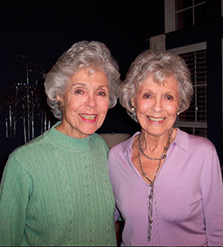
Where Are They Now?
After years of retirement, the piano-playing McVayne Twins resumed their place on the stage last February during their 82nd birthday bash in Dallas.
It was 1942 when Jane and Jean Feist battled snow-covered roads into Oberlin for their piano auditions at the Conservatory. The twins took their seats at separate pianos and played a duo repertoire, just as they had done since age 12.
“I don’t remember anyone being particularly blown away by our performance,” says Jane. But the pair’s likeness attracted plenty of inquisitive glances, especially given the presence of another set of piano-playing twins, Miles and Ernest Mauney ’47.
The College had entered a new era when the sisters arrived on campus. After the attack on Pearl Harbor, Oberlin switched to a three-semester accelerated wartime calendar. In 1943, as draftees and volunteers began disappearing from campus, a 700-male Navy V-12 unit arrived. “Although we were aware of the war, we looked at things differently,” says Jane. “We still managed to have a wonderful time.”
“Every weekend we girls would get all done up, hoping that a guy from the V-12 would ask us out,” laughs Jean. “But they didn’t want anything to do with us ‘little’ girls. They always left town on weekends.”
Graduating in 1947, Jane and Jean went on to play duo-piano with their older sister, Ruth, a Broadway singer, and with the Erie Philhar-monic Orchestra. The pair attended the Manhattan School of Music before taking up the stage name The McVayne Twins, a surname belonging to their great-grandmother. Their concert career included TV appearances and a 1948 Etude music magazine cover feature, which noted their distinct ability to “play as one.”
The twins went their separate ways after marrying; Jean to Carl Gronhagen, vice president of an importing firm, and Jane to filmmaker Larry Buchanan. Jean and her family traveled frequently to Europe, making homes in Houston, San Francisco, and Los Angeles. She published a volume of poetry, The Open Gate, and currently lives in Colorado Springs. Jane and her family spent 30 years in California, scouting locations for Larry’s films. After a brief stint in Arizona, Jane returned to California following her husband’s death in 2004.
The Mauney boys, meanwhile, who once dated Jane and Jean—(strictly for for laughs, says Jane)—also took to the stage after Oberlin, making TV appearances and transporting their Steinway pianos in a reconfigured van to shows all over the country.
“They were very entertaining,” says Miles’ wife, Dorothy, from the couple’s home in Hilton Head; Miles, recently diagnosed with Alzheimer’s disease, listens close by. “They would switch pianos on stage and keep introducing themselves to the audience: ‘In case you lost track, I’m Ernest…and I’m Miles.’ They were so identical I couldn’t tell them apart at my wedding.”
Ernest Mauney, who married and had two children, died in 1959. Shortly afterward, Miles and Dorothy moved to Oberlin, where Miles taught piano at the Conservatory. Two of their three children attended Oberlin: Phyllis Mauney ’75 and Cynthia Mauney ’79, musicians both.
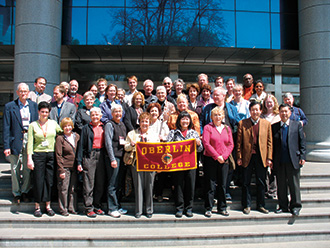 China
China
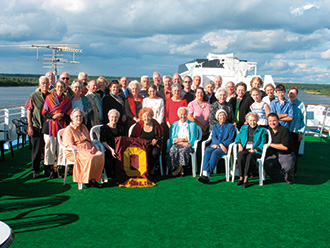 Russia
Russia
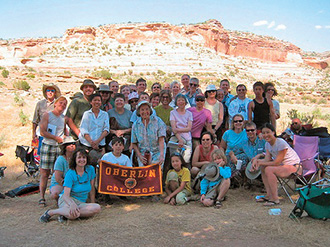 Colorado River
Colorado River
On Tour with the Alumni Association
China
In celebration of Oberlin Shansi’s upcoming centennial year, 30 alumni and friends traveled to China in April with study guide and former Shansi rep Bill Speidel ’57. The group enjoyed visits to Beijing, Taiyuan, Pingyao, Xi’an, Kunming, Lijiang, Chongqing, Shanghai, and various sites along the Yangzi River. Here they are joined by friends and gracious hosts at Shanxi Agricultural University in Taigu.
Russia
More than 40 alumni and friends gathered for a “Journey of the Czars” in June. Sailing from Moscow to St. Petersburg aboard the MS Glushkov, the group made its way down the Volga River and assorted other waterways to also visit Uglich, Yaroslavl, and Kizhi Island. Professor of Russian Language and Literature Thomas Newland served as the faculty study guide.
Colorado River
Forty alumni and friends joined faculty guest Karla Hubbard, associate professor of geology, on an OBIEAdventure! canoe trip down the Colorado River in June. The group enjoyed camping near the river in a true wilderness setting, hiking up Mee Canyon, floating down the river in life jackets, and learning about the geology of the region.
From Public Radio to Environmental Architecture: Alumni Speakers Enlighten Students
Steve Sherman ’81, principal house photographer at Carnegie Hall and senior music photographer for the New York Times, gave spring 2007 workshops to students working on performing arts portfolios and professional development. (Sponsor: Conservatory of Music)
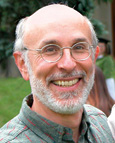
Robert Rosenberg ’77, professor of pharmacology, cell, and molecular physiology and director of the Curriculum in Neurobiology at the University of North Carolina, presented the lecture “Molecular Mechanisms of Activation of Neuronal Nicotinic Receptors.” (Sponsor: Department of Neuroscience)
Sylvia Hood Washington ’80, visiting research associate at the Institute for Environmental Science and Policy at the University of Illinois, presented the lecture “Ball of Confusion: African Americans and Environmental Engagement in Modern and Postmodern America.” (Co-sponsors: Department of African American Studies, Environ-mental Studies Program, and the Multicultural Resource Center)
Award-winning jazz trombonist, composer, and arranger Andy Hunter ’01 splits his time between New York and Shanghai, where he plays with ensembles of all sizes and performs musical styles ranging from jazz to blues to salsa. An Oberlin double-degree student in jazz trombone and East Asian studies and Chinese language, he now helps organize jazz festivals in Shanghai and brings musicians from around the world to China. Andy took part in Oberlin’s China Rising Symposium along with Manfred Elfstrom ’02, campaign coordinator for the New York-based China Labor Watch and a graduate student in international and public affairs at Columbia University. Manfred spent two years on a Shansi Fellowship in Taigu, China, before interning with the China Elections Project at the Carter Center. There, he studied village-level democracy and observed elections in several China provinces. (Sponsor: Department of East Asian Studies)
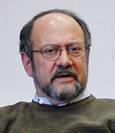
Robert Kuttner ’65, editor of The American Prospect and columnist for the Washington Post Writers Group, participated in a panel on the economic policies of the U.S. (Sponsor: Oberlin College Democrats)
Erik W. Murray ’91, a master of Capoeira Angola, the traditional African-Brazilian art form, has been returning to Oberlin since 2002 as a summer and winter-term resident professor of Capoeira. He has directed intensive seminars on African-Brazilian cultural traditions, music, and dances in Salvador, Bahia, and he serves on the therapeutic support staff at Northwestern Health Services in Philadelphia. (Venue: Rhythms of Resistance Conference)
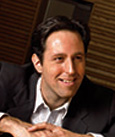
Spencer Myer ’00 performed at the Faculty Chamber Music Concert in March as a guest of Professor Peter Takacs. His orchestral, recital, and chamber music performances have been heard throughout the world. (Sponsor: Conservatory of Music)
Dancer Bill Young ’77 gave a workshop in contact/partnering to students in the newly renovated South Hall basement rehearsal space. (Sponsor: ArtsFest)

David Battino ’87 is a principal writer and designer at Batmosphere, where he writes feature articles and intensive product reviews for leading music-technology magazines. His visit to Oberlin highlighted material from his book, The Art of Digital Music, a book and DVD containing in-depth interviews with 56 visionary multimedia artists. The book ranked #1 on amazon.com for digital music books. (Venue: TIMARA Festival: The Art of Digital Music)
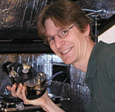
Matt Trawick ’91, assistant professor of physics at the University of Richmond, presented the lecture “Gluing Oil to Water for Fun and Profit: Self-Assembled Nano- structures in Diblock Copolymer Thin Films.” (Sponsor: Department of Physics and Astronomy)
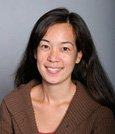
Christine Harley ’02, a housing credit officer with the Illinois Housing Development Authority, facilitated a workshop on multi-racial identities and issues of authenticity in working with communities of color. She is pursuing an MPP at the University of Chicago. (Sponsor: Multicultural Re-source Center)
Acclaimed musician, educator, and “Global Troubadour” Guy Mendilow ’99 returned to headline the Oberlin Spring Folkfest. Famous for his ability to incorporate international musical traditions and for fostering communication, respect, and tolerance in his workshops, he’s garnered awards such as Best World Music Act and winner of the World Music Song Contest 2005 by Global Rhythm Magazine. (Sponsor: Oberlin Folk Music Club)
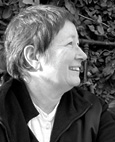
Susan Ubbelohde ’75, a founding partner in the architectural design firm Loisos + Ubbelohde Associates and a tenured faculty member in the architecture department at Berkeley, spoke about her work in natural daylighting, solar access, building performance, energy analysis, and the importance of microclimate. (Sponsor: Environ-mental Studies Program)
Lisa A. Phillips ’90 read from her book Public Radio: Behind the Voices (CDS Books/Perseus, 2006), which profiles public radio’s most prominent hosts and reporters. She discussed what it was like to interview and write about the people who made public radio such an important and creatively vibrant media outlet, and also her own career as a writer and former public radio host/reporter. Lisa teaches courses in journalism and reporting at the State University of New York-New Paltz. (Sponsor: WOBC)
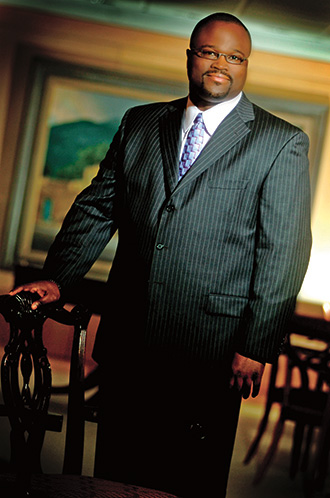
Banking on the Future
Giving back is more than just a part-time activity for Irvin Ashford ’91… it’s his job. As vice president of public affairs at Comerica Bank in Texas and state manager of the Community Reinvestment Act Department, his job is to create programs that benefit the community, be it through after-school and educational programs, by funding single and multifamily housing units, or by underwriting arts programs for underprivileged children.
“At Oberlin, I learned that men, particularly black men, have a responsibility to give back to the communities we come from. If not us, then who?” Ashford asks. “The world is full of people who take, deplete, drain, and squander resources.”
In the last few months alone, Ashford has earned the Chairman’s Outstanding Achieve-ment Award from Comerica Bank for his contributions in the areas of connectivity, leadership, and excellence, and the Winstead Award from the YMCA of Metropolitan Dallas for his leadership and support of local programs. In June, he was named a fellow of the British American Project, an exclusive network of young leaders from the two countries who meet annually for discussion and debate.
His success caught the attention last year of the Consortium on Financing Higher Education (COFHE), of which Oberlin is a member. The group was seeking out graduates of private schools who had received college scholarships and entered careers devoted to the service of others. So inspired by Ashford’s story, COFHE included him in its publication Take a Closer Look. Here is an excerpt:
Born in Alphabet City on the Lower East Side of Manhattan, the only son of a teenage mother, Irvin grew up in poverty. Gifted as child—he learned to read at age 3—his talents languished in the public school system. Without a father figure, he emulated the older children, skipping school, stealing, and taking part in gang activities. Irvin was well on his way to a life of crime. After several encounters with the police, he knew he had to find a way out.
At age 13, he participated in an educational program with the Boys’ Club of New York. He scored well on an aptitude test and was offered the opportunity to attend a summer school program at the Webb School, a boarding school in Tennessee. He did exceptionally well in the program and was offered a full scholarship to the school.
The second African American ever to graduate from Webb, Irvin never imagined that he would attend college, let alone a prestigious liberal arts institution. The mother of a fellow student encouraged him to apply to Oberlin. Trusting her advice, he applied and was accepted.
Excited and anxious to attend college, Irvin felt the impact of his poverty when he realized there was a price to pay; he and his family were virtually penniless. Oberlin offered him a generous financial aid package, without which college would have been impossible.
Irvin entered college with the desire to become rich and put his poverty-stricken years behind him. But Oberlin gave him a new mission: to help others escape what he had experienced growing up, especially those who lived in communities similar to his own.
A religion major at Oberlin, Irvin went on to earn a master’s degree in public affairs at the University of Texas at Austin and an MBA at the University of Dallas. A 2003 Fellow of the German Marshall fund, he was awarded a Woodrow Wilson Fellowship in graduate school.
He began his professional life in New York as director of economic development for two multi-million-dollar nonprofit agencies. He then moved to Texas to work for the City of Dallas as a senior economic development analyst, helping to secure financing for the American Airlines Center and its surrounding infrastructure.
“I’m just glad that I work for a company that believes in helping people be successful, and that I am in a position to invest, replenish, and build in the communities that need it the most,” says Ashford of Comerica Bank. “When I die, I want people to say, ‘That brother did his thing.’”
